- Home
- Naguib Mahfouz
Sugar Street tct-3
Sugar Street tct-3 Read online
Sugar Street
( The Cairo Trilogy - 3 )
Naguib Mahfouz
Sugar Street is the final novel in Nobel Prize-winner Naguib Mahfouz’s magnificent Cairo Trilogy, an epic family saga of colonial Egypt that is considered his masterwork.
The novels of the Cairo Trilogy trace three generations of the family of tyrannical patriarch al-Sayyid Ahmad Abd al-Jawad, who rules his household with a strict hand while living a secret life of self-indulgence. Sugar Street brings Mahfouz’s vivid tapestry of an evolving Egypt to a dramatic climax as the aging patriarch sees one grandson become a Communist, one a Muslim fundamentalist, and one the lover of a powerful politician. Filled with compelling drama, earthy humor, and remarkable insight, Mahfouz’s Cairo Trilogy is the achievement of a master storyteller.
Naguib Mahfouz
Sugar Street
116
Their heads were huddled around the brazier, and their hands were spread over its fire: Amina's thin and gaunt, Aisha's stiff, and Umm Hanafi's like the shell of a turtle. The beautiful pure-white ones were Na'ima's. The January cold was almost severe enough to freeze water at the edges of the sitting room, which had retained its time-honored appearance with its colored mats and the sofas distributed around the sides. The old lantern with its oil lamp had vanished, and hanging in its place was an electric light. The location had changed too, for the coffee hour had returned to the first floor. Indeed the entire upper story had moved downstairs to make life easier for the father, whose heart was no longer strong enough for him to climb to the top.
The family members had changed as well. Amina's body had withered, and her hair had turned white. Although barely sixty, she looked ten years older, and her transformation was nothing compared to Aisha's decline and disintegration. It was ironic or pathetic that the daughter's hair was still golden and her eyes blue, when her listless glance gave no hint of life and her pale complexion seemed the symptom of some disease. With a protruding bone structure and sunken eyes and cheeks, her face hardly appeared that of a thirty-four-year-old woman. Although the years had settled on Umm Hanafi, they did not seem to have marked her in any essential way, hardly diminishing her reserves of flesh and fat. Instead, they had accumulated on her skin and around her neck and mouth like crusts or earthy deposits. But her grave eyes glinted from participation in the family's silent sorrow.
Na'ima stood out in this group like a rose growing in a cemetery, for she had developed into a beautiful young woman of sixteen. Her head enveloped by a halo of golden hair and her face adorned by blue eyes, she was as lovely as her mother, Aisha, had been — or even more captivating — but as insubstantial as a shadow. Her eyes had a gentle, dreamy look suggesting purity,[innocence, and otherworldliness. She nestled against her mother's side, as though unwilling to be alone even for a moment.
Rubbing her hands together over the brazier, Umm Hanafi said, "The builders will finish the project this week after working for a year and a half…."
Na'ima responded sarcastically, "A building for Uncle Bayumi the drinks vendor…."
Aisha raised her eyes from the brazier to look at Umm Hanafi for a moment but made no comment. They had previously learned that the house once belonging to Mr. Muhammad Rid-wan would be torn down to allow construction of a four-story building for Uncle Bayumi the drinks vendor. This project had stirred up many old memories about Maryam and her divorce from Yasin what had become of Maryam? — and about Maryam's mother and her marriage to the drinks vendor Bayumi, who had gained possession of the house half by inheritance and half by purchase. Back then life had been worth living, and hearts had been carefree.
Umm Hanafi continued: "The most beautiful part of it, my lady, is Uncle Bayumi's new place for soft drinks, ice cream, and sweets, tt has lots of mirrors and electric lights, with a radio playing day and night. I feel sorry for Hasanayn the barber, Darwish the bean seller, al-Fuli the milkman, and Abu Sari' with his snack shop. They have to look out of their dilapidated premises at the store and apartments of their former comrade."
Pulling her shawl tighter around her shoulders, Amina said, "Glory to God who gives blessings…."
With her arms around her mother's neck, Na'ima commented, "The building blocks off our roof on that side. Once it's inhabited, how can we spend any time up there?"
Amina could not ignore the question raised by her beautiful granddaughter, if only out of concern for Aisha. She answered, "Pay no attention to the tenants. Do as you like."
She glanced at Aisha to see what impression her gracious reply had made. She was so afraid for her daughter that she was almost frightened of her. But Aisha was busy looking at herself in the mirror above the dresser between her room and her father's. She had not abandoned the custom of examining her reflection, even though it had become a meaningless exercise. With the passing days her face's withered appearance had ceased to alarm her.
Whenever a voice inside asked, "Where is the old Aisha?" she would answer indifferently, "And where are her sons, Muhammad and Uthman, and her husband, Khalil?"
Observing this, Amina was saddened, and her gloom quickly affected Umm Hanafi, who was so much a part of the family that their worries were hers.
Na'ima rose and went to the radio, which stood between the doors to the parlor and the dining room. Turning it on, she said, "It's time for the records, Mama."
Aisha lit a cigarette and inhaled deeply. Amina stared at the smoke, which spread out in a thin cloud over the brazier. A voice on the radio sang, "Companions from the good old days, how I wish you would return."
Na'ima resumed her seat, tucking the robe around her. Like her mother, she loved singing. She listened carefully so she could memorize the song and sing it in her pleasing voice. This interest was not dampened by the religious feelings that dominated her entire emotional life. She prayed conscientiously and had fasted during the month of Ramadan since the age often. She frequently dreamed of the mysteries of the spiritual realm and welcomed with limitless delight her grandmother's invitations to visit the mosque of al-Husayn. All the same she had never weaned herself from a love of singing. She sang whenever she was alone, in her room or in the bath.
Aisha approved of everything her one remaining child did, for Na'ima was the only bright hope on otherwise gloomy horizons. As pleased by her daughter's piety as by her voice, Aisha even loved and encouraged the girl's excessive attachment to her, not tolerating any comment on it. In fact, she had no patience for any kind of criticism, no matter how trivial or well-intentioned. Her only occupations at home were sitting, drinking coffee, and smoking. Whenever her mother invited her to help with the housework, not from a need for assistance but to distract Aisha from her thoughts, she was annoyed and uttered her famous phrase: "Oh, leave me alone". She would not let Na'ima lift a finger to help with the work either, since she feared the least exertion for her daughter. If she could have performed the prayer ritual for Na'ima, she would have, to spare her the effort.
Amina frequently chided Aisha about this, telling her that Na'ima was almost old enough to marry and needed to learn the duties of a housewife. Aisha always responded angrily, "Don't you see she's like a specter? My daughter can't bear any exertion. Leave her alone. She's my sole hope in the world."
Then, heartbroken, Arnina would abandon the conversation. Gazing sadly at Aisha, she saw the personification of shattered hopes. When she looked at this unhappy face, which seemed to have lost all its vitality, Amina's soul was overcome by sorrow. Apprehensive about distressing her daughter, she had learned to greet Aisha's rude answers and harsh comments with affectionate forbearance.
The voice kept on singing, "Companions from the good old days," while Aisha smoked and listened to the song. She had been fond of singing o
nce, and sorrow and despair had not killed her taste for it. Perhaps they had even enhanced it, since so many of the lyrics were plaintive and melancholy. Of course nothing could ever bring back her companions of the good old days. She wondered at times if that past had been a reality or a dream, a figment of her imagination. Where was that happy home? Where was her fine husband? Where were Uthman and Muhammad? Did only eight years separate her from that past?
Amina rarely liked these songs. The prime attraction of the radio for her was that it allowed her to hear recitations from the holy Qur'an and the news. The sad themes of the songs worried her. She was concerned about their effect on her daughter and remarked to Umm Hanafi one day, "Don't they sound like funeral laments to you?"
She could not stop thinking about Aisha and almost forgot the trouble she was having with high blood pressure. Visits to al-Husayn and to the other saints in their shrines were the only relief she found. Thanks to al-Sayyid Ahmad, who no longer restricted her movements, she was allowed to hurry off to God's sanctuaries whenever she felt the need. Amina herself was no longer the same woman she had once been. Grief and ill health had changed her considerably. With the passing years she had lost her amazing diligence and her extraordinary capacity for tidying up, cleaning, and running her home. Except for services to al-SayyLd Ahmad and Kamal, she paid little attention to the house. Satisfied to supervise, she had turned over the oven room and the pantry to Umm Hanafi and was remiss even in this supervision. Her confidence in their servant was boundless, for Umm Hanafi was part of the household. A lifelong companion, she had shared Amina's good and bad times and had been absorbed into the family, so that she identified with all their joys and sorrows.
They were silent for a time, as though the song had distracted them. Then Na'ima said, "I saw my friend Salma in the street today. She was in grade school with me. Next year she's going to sit for the baccalaureate examination."
Aisha commented with annoyance, "If only your grandfather had let you stay in school, you would have surpassed her. But he refused!"
The protest implied by Aisha's final phrase did not escape her mother, who said, "Her grandfather has his ideas, which he won't abandon. Would you have wanted her to pursue her studies, despite the effort involved, when she's a delicate darling who can't stand fatigue?"
Aisha shook her head without speaking, but Na'ima said with regret, "I wish 1 had finished my education. All the girls study today, just like boys."
Umm Hanafi observed scornfully, "They study because they can't find a bridegroom. But a beauty like you …"
Amina nodded her head in agreement and said, "You're educated, young lady. You have the grade school certificate. Since you won't need to find a job, what more than that would you want? Let's pray that God will strengthen you, clothe your captivating beauty with health, and put some meat and fat on your bones."
Aisha retorted sharply, "I want her to be healthy, not fat. Obesity's a defect, especially in girls. Her mother was the outstanding beauty of her day, and she wasn't fat."
Smiling, Amina said gently, "It's true, Na'ima, your mother was the most beautiful girl of her day."
Aisha sighed and said, "And then she became the cautionary tale of her day."
Umm Hanafi murmured, "May our Lord bring you happiness with Na'ima."
Patting the girl affectionately on the back, Amina said, "Amen, Lord of the universe."
They fell silent again as they listened to a new voice sing, "I want to see you every day."
Then the door of the house opened and closed. Umm Hanafi said, "My master". She rose and rushed out of the room to turn on the staii-way light.
They soon heard the customary taps of his walking stick. When he appeared at the entrance to the sitting room, they all stood up politely. Breathing heavily, he gazed at them a moment before saying, "Good evening."
They replied in unison, "Good evening to you."
Amina went to his room to put on the light, and he trailed after her, exuding an aura of dignified old age.
He sat down to regain his breath. It was only nine o'clock. He was dressed as elegantly as ever. His broadcloth cloak, striped silk caftan, and silk scarf were of the same type as before, but the white in his hair, his gray mustache, his slender, "deserted" body, and his early return were all symptomatic of a new era. Another novel development was the bowl of yogurt and the orange prepared for his supper. He had to avoid alcohol, the appetizershe ate when drinking, red meat, and eggs. Still, the sparkle in his wice blue eyes indicated that his desire for life had not flagged.
He proceeded to remove his clothes with Amina's assistance as usual. Then he put on a wool nightshirt, wrapped up in a robe, donned a skullcap, and sat down cross-legged on the sofa. Amina seived him supper on a tray, and he ate without enthusiasm. Afterward she gave him a glass half filled with water, to which he added six drops from a bottle of medicine. He got it down with a frowning expression of disgust. Then he mumbled, "Thanks to God, Lord of the universe."
His doctor had frequently told him that the medicine was a temporary measure but that this new diet would be permanent. The physician had often cautioned him against being reckless or neglectful, for his high blood pressure had become severe, affecting his heart. Experience had taught al-Sayyid Ahmad to heed these instructions, because he had suffered whenever he had ignored them. Every time he had exceeded the limits, he had paid the price. He had finally been forced to give in, eating or drinking only what he was supposed to and coming home by nine. His heart had not given up hope that, by whatever means, he would regain hishealth and enjoy a pleasant, quiet existence, even though his past life had disappeared forever.
He listened with pleasure to the song coming from the radio. Seated on the pallet, Amina was talking about the cold and the rain that had poured down before noon. Paying no attention to her, he commented happily, "I heard that some of the old songs will be broadcast tonight."
The woman smiled appreciatively, since she liked that kind of music, perhaps most of all because her husband did. Delight sparkled for a few moments in the man's eyes before giving way to listlessness. He could no longer enjoy happy feelings unreservedly without having them suddenly turn sour on him. A confrontation with the facts would awaken him from his happy dream, as reality impinged on him from every direction. The past was nothing but a dream. What occasion was there for joy, when the days of fellowship, musical ecstasy, and health had departed forever? Delicious food and drink had vanished along with his well-being. Once he had strutted across the earth like a camel, his laughter reverberating from deep inside him, and dawn had found him intoxicated with all sorts of delights. Now he was obliged to return home from his soirees at nine so he could be in bed by ten, and the amountshe ate, drank, and walked were carefully prescribed.
He was the heart and the mainstay of this household, which time had afflicted with sorrows. The wretched Aisha was a thorn in his flesh, for he was incapable of mending the shreds of her life. He could hardly feel comfortable about her condition, since the morrow might find her miserably alone, without a father or a mother. He was also anxious about his own health, which was threatened by various complications of high blood pressure. What he feared most was having his strength fail him, so that he would be forced to lie in bed like a dead man. This had happened to many of his friends and loved ones. These thoughts hovered around him like flies, and he sought refuge with God from their evil torment. Yes, he would hear the old songs and fall asleep to their melodies.
"Leave the radio on even after I'm asleep."
She nodded her head with smiling agreement. Then he sighed and continued: "The stairs are really hard on me!"
"Rest at the landings, sir."
"But it's so humid in the stairwell. What cursed weather we're having this winter…". Then he asked, "I bet you visited al-Husayn as usual despite the cold."
She answered shyly and uneasily, "Hardships seem trivial when I visit him, sir."
"It's all my fault!"
T
rying to appease him, she added, "I walk around the holy tomb and pray for your health and well-being."
He was in urgent need of sincere prayers. Every good thing in life had been denied him. Even the cold shower with which he always refreshed his body had been forbidden him, since it was said to be dangerous for his arteries. "God have mercy on us," he thought, "when everything good becomes harmful."
They soon heard the door of the house slam shut. Raising her eyes, Amina murmured, "Kamal."
In a few minutes their son entered the room in his black overcoat, which revealed how thin and tall he was. He looked at his father through gold-rimmed glasses. A compact, bushy black mustache lent him a dignified and manly air. He leaned over to greet his father.
Al-Sayyid Ahmad invited him to sit down and as usual asked with a smile, "Where have you been, Professor?"
Kamal loved this gracious, affectionate tone, which his father had only recently adopted with him. Taking a seat on the sofa, he answered, "I was at the coffeehouse with some friends."
What sort of friends would they be? Kamal appeared exceptionally serious, sober, and dignified for his age, spending most of his evenings in his study. What a difference there was between him and Yasin! Of course, each had his defects. Still smiling, al-Sayyid Ahmad asked, "Did you attend the Wafd Party congress today?"
"Yes. We heard a speech from the leader, Mustafa al-Nahhas. It was a memorable day."
"I was told it would be an important event but wasn't able to go. I gave rny ticket to one of my friends. My health's no longer up to the fatigue."
Overcome by sympathetic affection, Kamal stammered, "May our Lord strengthen you."
"Weren't there any incidents?"
"No. The day passed peacefully. For a change, the police were co>nteni: to watch."
The man nodded his head with relief. Then in a tone of voice that indicated the special significance he attached to the topic, he said, "Let me revert to an old subject. Do you still persist in your mistaken opinion about private lessons?"

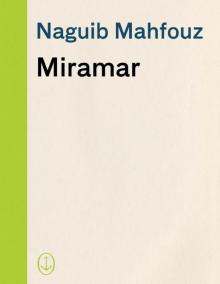 Miramar
Miramar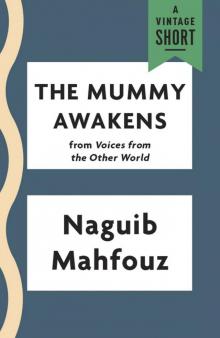 The Mummy Awakens
The Mummy Awakens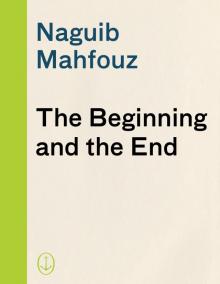 The Beginning and the End
The Beginning and the End Respected Sir, Wedding Song, the Search
Respected Sir, Wedding Song, the Search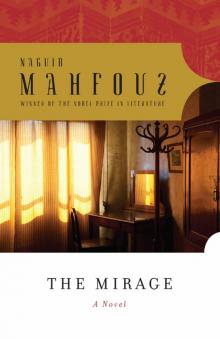 The Mirage
The Mirage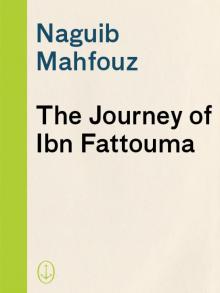 Novels by Naguib Mahfouz
Novels by Naguib Mahfouz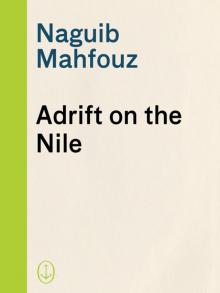 Adrift on the Nile
Adrift on the Nile Karnak Café
Karnak Café Heart of the Night
Heart of the Night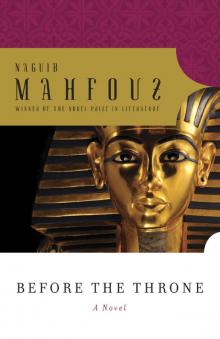 Before the Throne
Before the Throne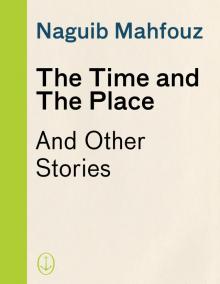 The Time and the Place: And Other Stories
The Time and the Place: And Other Stories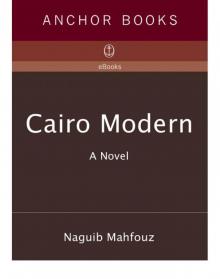 Cairo Modern
Cairo Modern Arabian Nights and Days
Arabian Nights and Days The Day the Leader Was Killed
The Day the Leader Was Killed Morning and Evening Talk
Morning and Evening Talk Three Novels of Ancient Egypt Khufu's Wisdom
Three Novels of Ancient Egypt Khufu's Wisdom Akhenaten: Dweller in Truth
Akhenaten: Dweller in Truth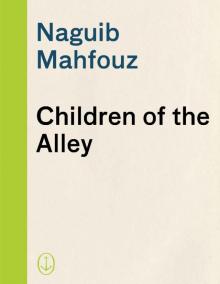 Children of the Alley
Children of the Alley Voices From the Other World
Voices From the Other World The Harafish
The Harafish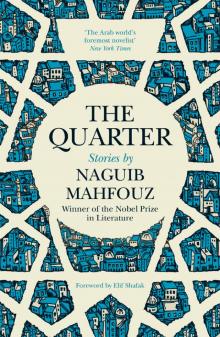 The Quarter
The Quarter The Seventh Heaven: Supernatural Tales
The Seventh Heaven: Supernatural Tales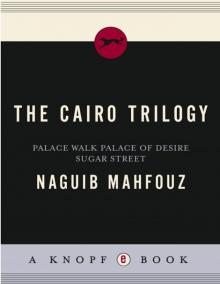 The Cairo Trilogy: Palace Walk, Palace of Desire, Sugar Street
The Cairo Trilogy: Palace Walk, Palace of Desire, Sugar Street Khan Al-Khalili
Khan Al-Khalili Three Novels of Ancient Egypt Khufu's Wisdom, Rhadopis of Nubia, Thebes at War
Three Novels of Ancient Egypt Khufu's Wisdom, Rhadopis of Nubia, Thebes at War Three Novels of Ancient Egypt
Three Novels of Ancient Egypt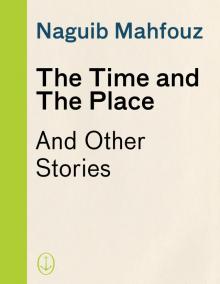 The Time and the Place
The Time and the Place Palace Walk tct-1
Palace Walk tct-1 Akhenaten
Akhenaten The Seventh Heaven
The Seventh Heaven The Thief and the Dogs
The Thief and the Dogs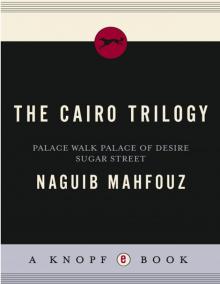 The Cairo Trilogy
The Cairo Trilogy Sugar Street tct-3
Sugar Street tct-3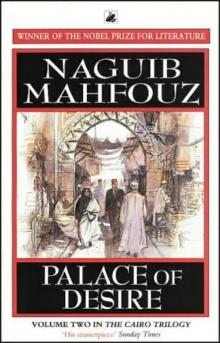 Palace of Desire tct-2
Palace of Desire tct-2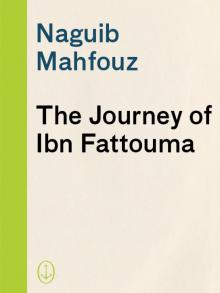 The Journey of Ibn Fattouma
The Journey of Ibn Fattouma